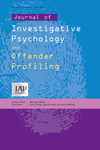
Journal of Investigative Psychology and Offender Profiling
Scope & Guideline
Exploring the Minds Behind Crime.
Introduction
Aims and Scopes
- Investigative Interviewing Techniques:
The journal explores various methodologies in investigative interviewing, including cognitive interviews and their effectiveness, as well as the psychological dynamics involved in suspect responses. - Criminal Behavior Analysis:
A significant focus is placed on analyzing patterns of criminal behavior, including studies on psychopathy, personality traits, and motivations behind specific crimes such as homicide and sexual offenses. - Victimology and Offender Profiling:
The journal examines the relationships between victims and offenders, utilizing demographic characteristics to better understand the dynamics of crimes, including filicide and femicide. - Innovative Methodologies in Crime Investigation:
Research often includes the development and evaluation of new techniques, such as geographical profiling and the use of technology in crime investigation, to enhance the efficiency and effectiveness of law enforcement. - Systematic Reviews and Meta-Analyses:
The journal contributes to the field through comprehensive reviews that consolidate existing research, providing insights into best practices and gaps in current knowledge.
Trending and Emerging
- Impact of Technology on Crime and Investigation:
Emerging themes include the effects of technology, such as remote video interfaces and online interactions, on criminal behavior and investigative practices, particularly in the context of the COVID-19 pandemic. - Psychological Profiling of Offenders:
There is an increasing focus on psychological profiling, including the study of personality traits (e.g., dark triad) and their correlation with criminal behavior, enhancing the understanding of offender motivations. - Victim-Centered Research:
Research that centers on the experiences and characteristics of victims, particularly in cases of domestic violence and sexual offenses, is gaining prominence as a crucial aspect of understanding crime. - Dynamic and Contextual Factors in Crime:
Studies examining the contextual factors influencing criminal behavior, such as environmental and situational variables, are becoming more common, reflecting a shift towards a more holistic understanding of crime. - Interrogation Techniques and Suspect Behavior:
There is a growing interest in the psychological aspects of interrogation, including suspect denial of guilt and the effectiveness of various interview techniques, highlighting the complexities of human behavior during investigations.
Declining or Waning
- Traditional Polygraph Testing:
Research related to polygraph testing, including its validity and applications, has seen a decline as newer methods and technologies for deception detection gain traction. - General Crime Statistics:
There has been a noticeable decrease in publications that focus solely on broad crime statistics without a psychological or investigative angle, as the journal shifts towards more nuanced analyses. - Historical Crime Analyses:
While historical perspectives on crime, such as studies on filicides from decades past, are still present, the frequency of such analyses has decreased as contemporary issues take precedence.
Similar Journals

INTERNATIONAL JOURNAL OF OFFENDER THERAPY AND COMPARATIVE CRIMINOLOGY
Driving progress in offender therapy and criminological research.INTERNATIONAL JOURNAL OF OFFENDER THERAPY AND COMPARATIVE CRIMINOLOGY, published by SAGE PUBLICATIONS INC, is a leading journal in the fields of criminology, psychology, and forensic medicine, with a robust legacy dating back to 1966. With ISSN 0306-624X and E-ISSN 1552-6933, this journal presents innovative research and theoretical discussions that seek to improve offender rehabilitation and comparative criminological studies. The journal’s high-impact contributions have garnered it a prestigious Q1 ranking in Arts and Humanities and a Q2 ranking in Pathology and Forensic Medicine as of 2023, making it a valuable resource for scholars and practitioners alike. Researchers will find the journal's commitment to advancing knowledge through empirical evidence and critical analysis particularly compelling, as it addresses contemporary challenges in offender therapy. Though not an Open Access journal, its diverse scope ensures that readers have access to pivotal insights that drive progress and inform policy in justice and rehabilitation systems. With a focus on interdisciplinary approaches, the journal serves as an essential platform for academics, professionals, and students aiming to deepen their understanding of comparative criminology and its applications.

PSYCHOLOGY CRIME & LAW
Unraveling the Complexities of Human Behavior in Legal ContextsPSYCHOLOGY CRIME & LAW, published by Routledge Journals, Taylor & Francis Ltd, is a premier academic journal dedicated to the intersection of psychology, criminology, and the law. With an ISSN of 1068-316X and an E-ISSN of 1477-2744, this journal provides a critical platform for the dissemination of cutting-edge research and innovative methodologies in the fields of psychology, forensic medicine, and legal studies. Spanning over three decades (1994 to 2024), it holds impressive Scopus rankings, placing it in Q1 and Q2 quartiles for its contributions to law and forensic medicine, highlighting its standing within the academic community. PSYCHOLOGY CRIME & LAW is particularly noted for addressing contemporary issues at the crossroads of human behavior and legal standards, making it essential reading for scholars, practitioners, and students alike. While the journal is not open access, it offers valuable insights into a variety of topics, from criminal psychology to the implications of mental health in legal contexts, ensuring that it remains an influential resource for those engaged in research and professional practice.

Forensische Psychiatrie Psychologie Kriminologie
Connecting Research with Legal and Psychological Practices.Forensische Psychiatrie Psychologie Kriminologie is a leading academic journal published by SPRINGER HEIDELBERG, specializing in the intersection of forensic psychiatry, psychology, and criminology. With an ISSN of 1862-7072 and E-ISSN 1862-7080, this journal has built a reputable place in the academic community, featuring essential research that informs the critical dialogue on legal and psychological practices as they pertain to mental health and criminal behavior. Indexed in Scopus, it holds a diverse range of impact factors across multiple disciplines, including a Q2 ranking in Law and notable placements within Applied Psychology and Psychiatry and Mental Health. The journal's commitment to advancing evidence-based practices and understanding of forensic mental health is evident from its broad editorial scope, making it a vital resource for researchers, clinicians, and students alike. The journal spans a timeline from 2007 to 2024, ensuring that it provides up-to-date insights into evolving methodologies and findings within this critical field.
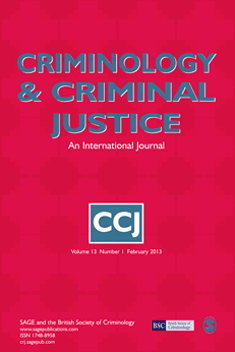
Criminology & Criminal Justice
Connecting Scholars and Practitioners in the Quest for JusticeCriminology & Criminal Justice is a leading academic journal published by SAGE Publications Ltd that serves as an essential resource for scholars, practitioners, and students in the field of criminology and legal studies. With its ISSN 1748-8958 and E-ISSN 1748-8966, this journal has established itself as a crucial platform for innovative research, analysis, and discourse, consistently maintaining a prestigious Q1 ranking in Law. Spanning a diverse range of topics within criminology and criminal justice, it promotes interdisciplinary perspectives that reflect current trends and challenges within the domain. With a notable 93rd percentile ranking in Scopus, the journal ensures that its publications meet rigorous academic standards, fostering the advancement of knowledge and practice in the field. Based in the United Kingdom and catering to a global audience, this journal enhances scholarly communication and collaboration, making it an indispensable tool for those dedicated to unraveling the complexities of crime and justice.
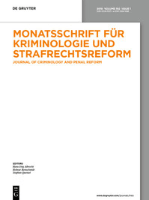
Monatsschrift fur Kriminologie und Strafrechtsreform
Exploring the Intersection of Crime and Reform.Monatsschrift für Kriminologie und Strafrechtsreform is a prestigious academic journal dedicated to advancing the fields of criminology and legal reform. Published by WALTER DE GRUYTER GMBH in Germany, this journal boasts a significant history since its inception in 1943, continually evolving its focus and scope from 2010 to 2024 to address contemporary issues in law and criminal justice. With an impressive Q2 rating in Law and a ranking in the 46th percentile among social sciences law journals, it serves as a vital resource for researchers, practitioners, and students alike. By publishing innovative articles, critical reviews, and comprehensive studies, the journal aims to foster academic discourse and propel discussions surrounding legislative reforms and criminological theories. Although it does not currently offer open access, readers can obtain valuable insights that contribute to both academic scholarship and practical applications in the legal field, thereby enhancing the understanding of complex societal dynamics related to crime and law enforcement.
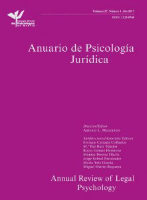
Anuario De Psicologia Juridica
Unlocking Knowledge in Psychology and Legal Practice.Anuario De Psicologia Juridica is a prestigious academic journal published by the COLEGIO OFICIAL PSICOLOGOS MADRID, specializing in the intersection of psychology and law. Since becoming an Open Access publication in 2013, the journal has made significant strides in expanding access to high-quality research, thereby fostering knowledge dissemination and engagement in the fields of Applied Psychology, Law, and Forensic Medicine. With a notable impact factor and categorized as Q3 in Applied Psychology, Q1 in Law, and Q2 in Pathology and Forensic Medicine, it stands out for its contributions to the evolving nature of forensic psychology and legal assessment. As of 2023, the journal is ranked in the 90th percentile among law journals and in the 58th percentile among pathology and forensic medicine, underscoring its relevance and authority. Researchers, professionals, and students will find Anuario De Psicologia Juridica to be an invaluable resource for cutting-edge research and practical applications that aim to bridge psychological theories with legal practices.

Criminal Law and Philosophy
Exploring the Boundaries of Justice and MoralityCriminal Law and Philosophy, published by SPRINGER in the Netherlands, is an esteemed peer-reviewed journal that explores the intricate intersections of law and philosophical inquiry. With an ISSN of 1871-9791 and an E-ISSN of 1871-9805, this journal is a vital resource for researchers, professionals, and students interested in the ethical, theoretical, and practical dimensions of criminal law. Renowned for its rigorous contributions and innovative perspectives, the journal has achieved a commendable Q2 ranking in both the fields of Law and Philosophy as of 2023, and demonstrates a strong commitment to fostering critical dialogue in these disciplines. With a Scopus rank placing it in the top 25% of Philosophy journals and above the 56th percentile in Law, Criminal Law and Philosophy continues to expand its influence and accessibility within the academic community and beyond, making it an indispensable platform for advancing scholarship at the confluence of law and moral theory.

Journal of Criminal Psychology
Unraveling the complexities of criminal behavior with rigorous analysis.Journal of Criminal Psychology, an esteemed publication by EMERALD GROUP PUBLISHING LTD, serves as a pivotal resource in the interdisciplinary study of criminal behavior through the lenses of psychology and law. Since its inception in 2011, this journal has significantly contributed to the understanding of psychological principles as they apply to crime, law enforcement, and social justice, making it a vital source for both researchers and practitioners. With a commendable ranking of Q1 in Law and Q3 in Applied and Social Psychology for 2023, the journal guarantees high-quality research findings that can influence policy and practice across these domains. Although it does not offer open access, its rigorous peer-review process ensures that every published article adheres to the highest academic standards. The Journal of Criminal Psychology not only fosters academic discourse but also drives innovation in criminal justice practices, making it essential reading for anyone dedicated to the enhancement of ethical standards in legislation and law enforcement.
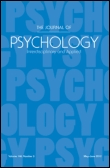
JOURNAL OF PSYCHOLOGY
Innovative Insights at the Intersection of Psychology and EducationWelcome to the JOURNAL OF PSYCHOLOGY, a premier publication dedicated to fostering innovative research in the field of psychology and its intersections with education and management. Published by ROUTLEDGE JOURNALS, TAYLOR & FRANCIS LTD, this journal has been a vital resource since its inception in 1936, providing a platform for scholarly discourse until 2024. As a testament to its quality and impact, the journal consistently ranks in the top quartiles across various categories including Q1 in Business, Management and Accounting and Q1 in Education, reflecting its broad relevance and application. The JOURNAL OF PSYCHOLOGY is recognized within Scopus, demonstrating a strong analytical presence with ranks in both Psychology and Education. While the journal is not open access, it continues to draw contributions from leading experts and emerging scholars alike, positioning itself at the forefront of psychological research. Researchers, professionals, and students will find rich, thought-provoking articles that address contemporary challenges and advances within the realm of psychology.
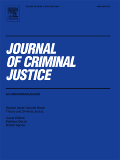
JOURNAL OF CRIMINAL JUSTICE
Shaping the future of criminal justice research.The JOURNAL OF CRIMINAL JUSTICE, published by Elsevier, stands at the forefront of interdisciplinary research at the nexus of law, psychology, and sociology. With an impressive impact factor and consistently ranking in the Q1 category across multiple disciplines, including Applied Psychology and Law, this journal serves as a vital platform for exploring critical issues in criminal justice policy, behavior, and system effectiveness. Since its inception in 1973, the journal has evolved its scope to encompass contemporary challenges and innovative responses within the field. Researchers, professionals, and students can benefit from access to high-quality, peer-reviewed articles that not only reflect current trends but also drive future discourse. Though currently not open access, the journal's rigorous standards ensure that all published works contribute significantly to advancing knowledge and practice in criminal justice and related areas.